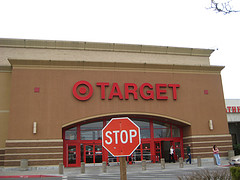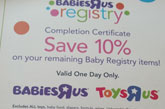Phillip and his wife set up a Babies ‘R’ Us/Toys ‘R’ Us registry for their soon-to-arrive new baby. After all of the fun of zapping items in the store with guns, they received a registry completion coupon in the mail. After the shower and baby gifts stop coming, they could buy anything left on the registry for 10% off. These coupons are pretty common, and come in handy. Well, unless you’re Phillip’s family. Their registry completion coupon isn’t very handy at all, because it excludes just about everything on their registry. [More]
registry

Target "Lied To Me, Yelled At Me," And "Treated Me Like Crap"
More wedding/baby registry pain from Target, a reader calling herself Consumer in MD, has started a blog called “Target is the Devil,” with the aim of convincing other consumers not to register their weddings and baby showers with Target after they ripped her off to the tune of $75.01. She tried to return a gift from the registry (with a gift receipt), and Target told her that according to their records the current clearance price is what the person actually paid for the gift. It turned out that this wasn’t the case, and when she brought the actual customer receipt back to Target they refused to refund her the additional money.

"Do Not Mail" Junk Mail Registry Called For By Green Group
ForestEthics has started a petition to enact a Do Not Mail registry, similar to the one that’s sort of in effect (when marketers choose to abide by it) for telemarketing. Their reasoning: junk mail is enormously wasteful and damaging to the environment. We agree, but we’re in favor of the registry for the simple reason that less junk mail means fewer uninvited distractions, ID theft risks, and trash we’d have to deal with every day.

How Effective Is The Do Not Call Registry?
A report recently released by the Federal Trade Commission (FTC) hails the Do Not Call registry as “an effective consumer protection initiative.” Since its inception in 2003, the registry has grown to include 132 million numbers.
The agency said the program’s primary goal of reducing unwanted telemarketing calls is succeeding, largely due to a “high degree of compliance by telemarketers.” The report notes that while roughly 1.15 million complaints were received in fiscal 2006 from 374,937 registered phone numbers, that was the equivalent of only about one-quarter of 1 percent of the numbers in the database.
Telemarketers are required to pay an annual fee to access the list so they know whose dinner not to interrupt. Still, the FTC put down its fork and left the table to fine 28 companies, including DirecTV, for calling people on the Do Not Call registry.


